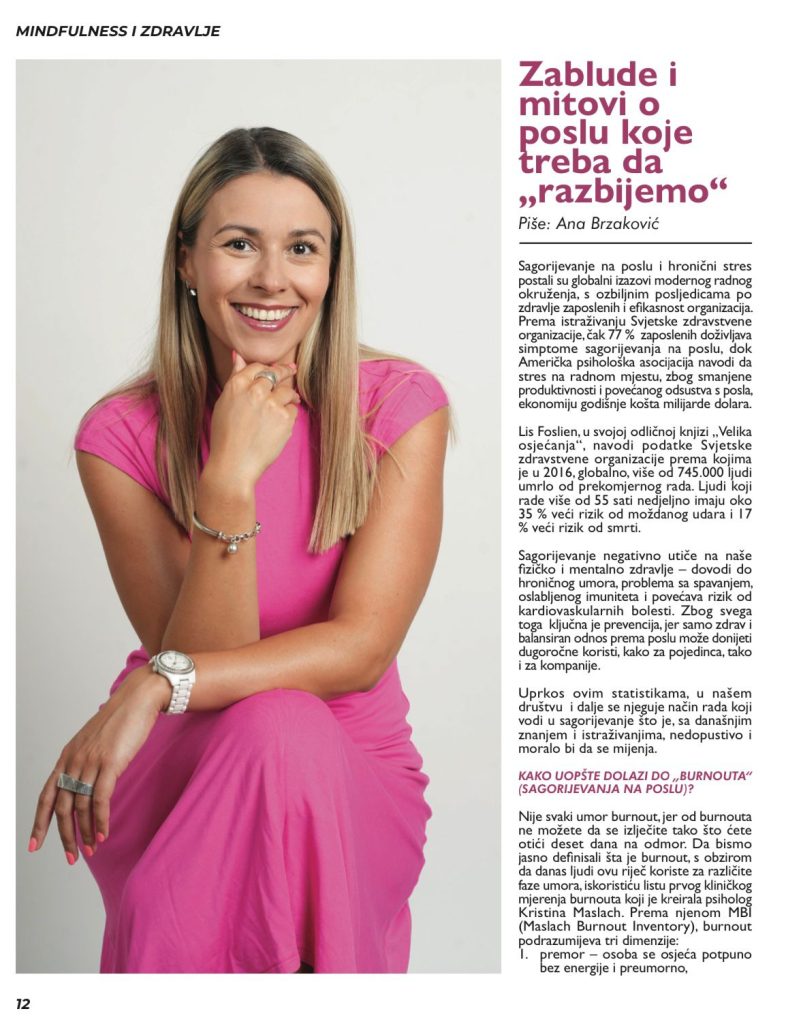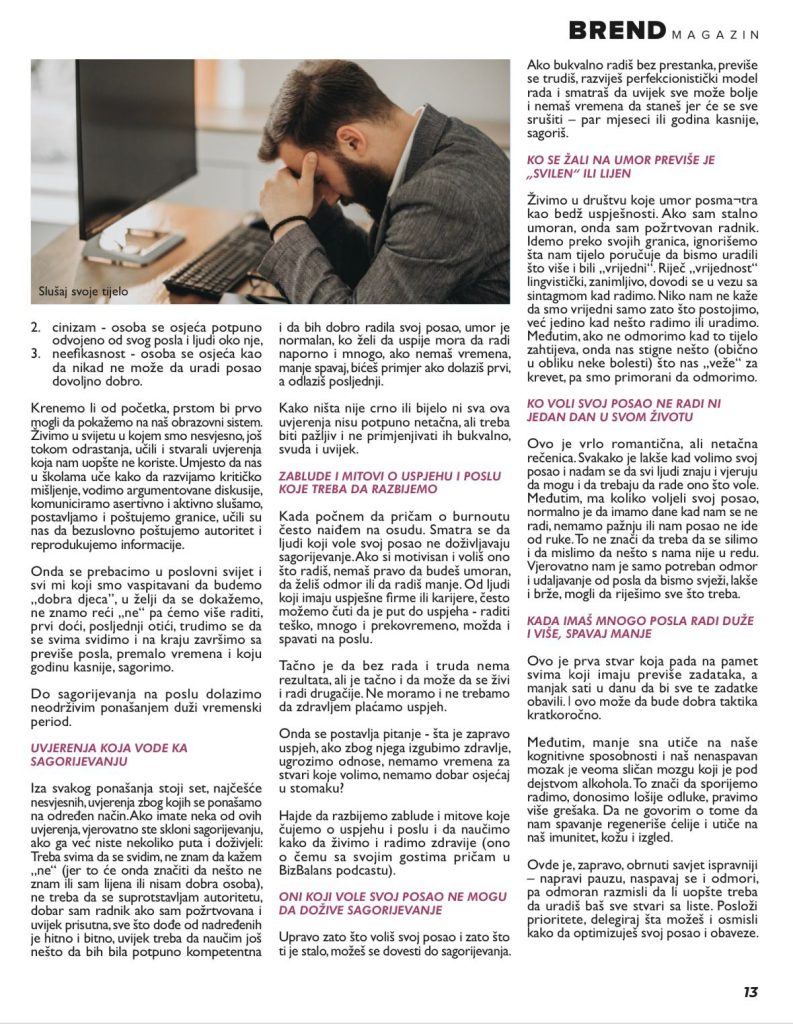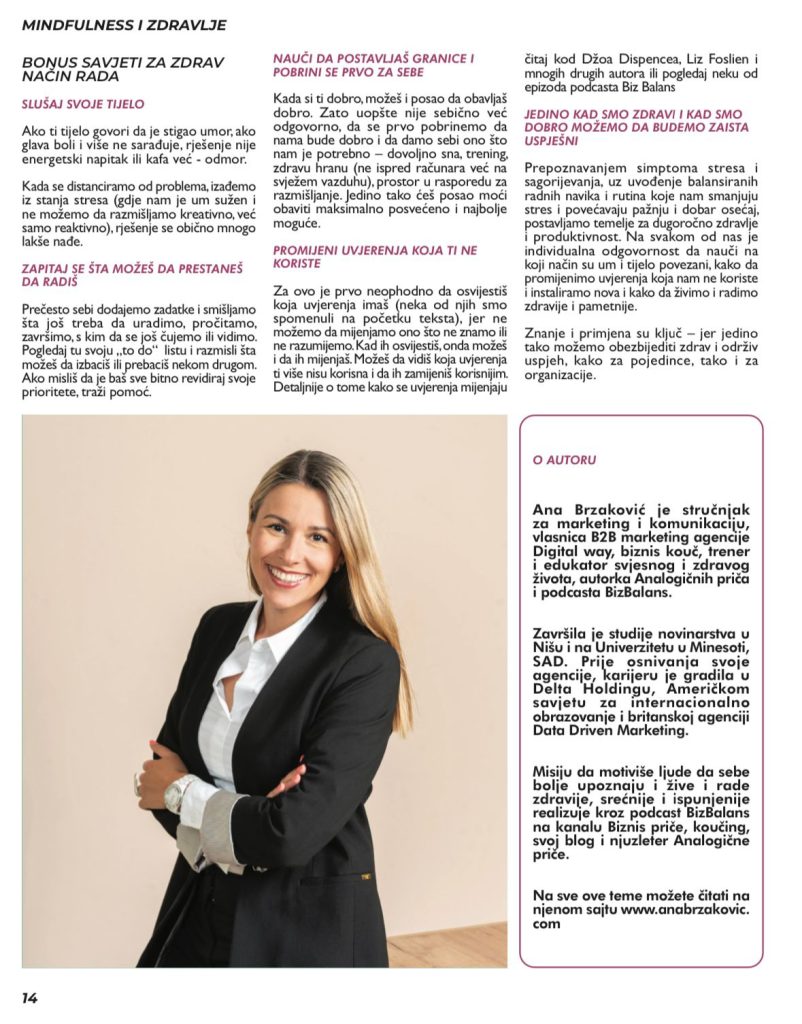Job burnout and chronic stress have become global challenges of the modern workplace with serious consequences for the health of employees and the efficiency of organizations. According to the World Health Organization, as much as 77% of employees experience symptoms of job burnout. The American Psychological Association has published that workplace stress costs the economy billions of dollars annually due to decreased productivity and increased absenteeism.
Liz Foslien, in her book “Big Feelings”, states that the World Health Organization says that in 2016, more than 745000 people died from overwork. People who work more than 55 hours per week have about 35% higher risk of having a stroke and 17% higher risk of death.
Burnout negatively affects our physical and mental health. It leads to chronic fatigue, sleep problems, a weakened immune system, and increases the risk of cardiovascular disease. That’s why prevention is key. Only a healthy and balanced relationship with work can bring long-term benefits, both for individuals and for companies.
Despite these statistics, our society still cultivates a way of working that leads to burnout. With the knowledge and research we have today, this is unacceptable and must change.
How does burnout actually occur?
Not all fatigue is “burnout,” because you can’t cure burnout by going on a 10-day vacation.
To clearly define burnout (because people today use it for different phases of fatigue) I will use the list of the first clinical measurement of burnout created by psychologist Christina Maslach. According to her MBI (Maslach Burnout Inventory), burnout involves three dimensions:
1. Exhaustion – the person feels completely without energy and exhausted.
2. Cynicism: the person feels completely detached from their work and the people around them.
3. Inefficiency: the person feels they can never do the job well enough.
If we start at the very beginning, we can first point a finger at our education system. We live in a world where, unknowingly, we have been learning and creating beliefs since childhood that are not at all useful to us. Instead of teaching us in schools how to develop critical thinking, conduct reasoned discussions, communicate assertively, listen actively, and set and respect boundaries, they taught us to unconditionally respect authority and reproduce information.
All of us, who were raised to be “good children” eager to prove ourselves by not knowing how to say “no” will work more, be the first to arrive, the last to leave, will try to please everyone and in the end we end up with too much work, too little time. A few years later we experience burnout.
Burnout occurs because of unsustainable behavior over a long period of time.
Beliefs that lead to burnout
Behind every behavior is a set of (usually unconscious) beliefs that cause us to behave in a certain way. If you have any of these beliefs, you are probably prone to burnout:
- I need to please everyone,
- I can’t say no (that would mean I’m lazy or not a good person),
- I shouldn’t oppose authority,
- I’m a good worker if I’m self-sacrificing and always present,
- Everything that comes from superiors is urgent and important,
- I always need to learn something new to be fully competent and to do my job well,
- Fatigue is normal,
- Whoever wants to succeed has to work hard and a lot,
- If you don’t have time, sleep less,
- You’ll be an example if you come first and leave last.
Since nothing is black or white, not all of these beliefs are completely untrue. But one should be careful not to apply them literally, everywhere, and always.
We need to redefine the way we live and work
Illusions and myths about success and work that need to be shattered
When I start talking about burnout, I often encounter condemnation. It is believed that people who love their job do not experience burnout. You have no right to be tired, to want a vacation, or to work less if you are motivated and love what you do. People who are successful say that the path to success is to work hard and maybe even sleep at work.
It is true that without work and effort, there are no results. It is also true that it is possible to live and work differently. We don’t have to and shouldn’t pay for success with our health.
Then the question arises. What is success if we lose our health because of it? Jeopardize relationships? Don’t have time for things we love? Don’t have a good feeling in our stomachs?
Let’s dispel the myths and misconceptions we hear about success and work and learn how to live and work healthier (what I talk about with my guests on the BizBalans podcast).
Those who love their job can’t experience burnout.
Just because you love your job and care about it, you can drive yourself to burnout. If you literally work non-stop, try too hard, develop a perfectionist work model, and believe that everything can always be better, you don’t have time to stop because everything will fall apart – a few months or years later – you’ll burn out.
Whoever complains about fatigue is too ‘soft’ or lazy.
We live in a society that views fatigue as a badge of success. If I’m constantly tired, then I’m a dedicated worker. We go to our limits, ignoring what our bodies tell us, so we can do as much as possible and be “worthy.” No one tells us that we are worthy just because we exist but only when we do something or achieve something. However, if we don’t rest when our body asks us to, then something catches up with us (usually in the form of some illness) that glues us to the bed and forces us to rest.
Whoever loves their job doesn’t work a single day in their life.
This is a very romantic but inaccurate statement. It’s certainly easier when we love our job and I hope everyone knows and believes that they can and should do what they love. However, no matter how much we love our job, it’s normal to have days when we don’t feel like working, we don’t have focus, or our job isn’t going well. That doesn’t mean we have to force ourselves and that something is wrong with us. We probably need a rest and a break from work so that we can come back fresh and solve everything we need more easily and quickly.
When you have a lot of work, work longer and harder, and sleep less.
This is the first thing that comes to mind for everyone who has too many tasks and not enough hours in the day to complete them all. This could be a good tactic in the short term.
However, less sleep affects our cognitive abilities and our sleep-deprived brain is very similar to a brain under the influence of alcohol. This means we work slower, make worse decisions, and make more mistakes. Not to mention that sleep regenerates our cells and affects our immunity, skin, and appearance.
Here, the opposite advice is actually more correct – take a break, get some sleep and rest, and then, refreshed, consider whether you really need to do all the things on your list. Prioritize, delegate what you can, and figure out how to optimize your work and responsibilities.
Additional tips to avoid burnout and have a healthy work style:
Listen to your body
If your body is telling you that you’re tired, if your head hurts and no longer cooperates, the solution is not an energy drink or coffee, but rest. When we distance ourselves from the problem, we come out of a state of stress (where our mind is narrowed and we can’t think creatively but only reactively), the solution is usually much easier to find.
Ask yourself what you can stop doing
We often add tasks to ourselves and think of what else we need to do, read, and finish, and who else to talk to or see. Look at your “to-do” list and think about what you can remove or pass on to someone else. If you think that everything is really important – review your priorities, and seek help.
Learn to set boundaries and take care of yourself first
When you’re good, you can do your job well. That’s why it’s not selfish at all, but responsible to first make sure we are well and give ourselves what we need – enough sleep, exercise, healthy food (not in front of the computer but in the fresh air), space in our schedule for thinking. Only then can the work be done with maximum dedication and in the best possible way.
Change the beliefs that don’t serve you
For this, it is first necessary to be aware of which beliefs (some of which we mentioned at the beginning of the text) you have, because we cannot change what we do not know or understand. Once you are aware of them, you can change them. You can see which beliefs no longer serve you and replace them with more useful ones. For more details on how to change beliefs, read Joe Dispenza, Liz Foslien (and many other authors) or watch one of the episodes of the Biz Balans podcast ☺
Only when we are healthy and well can we truly be successful
By recognizing the symptoms of stress and burnout, and by introducing balanced work habits and routines that reduce our stress and increase our focus and well-being, we are laying the foundation for long-term health and productivity. It is the individual responsibility of each one of us to learn how the mind and body are connected, how to change beliefs that do not serve us, and how to live and work healthier and smarter.
Knowledge and application are the key. Only then we can ensure healthy and sustainable success, both for individuals and organizations.





